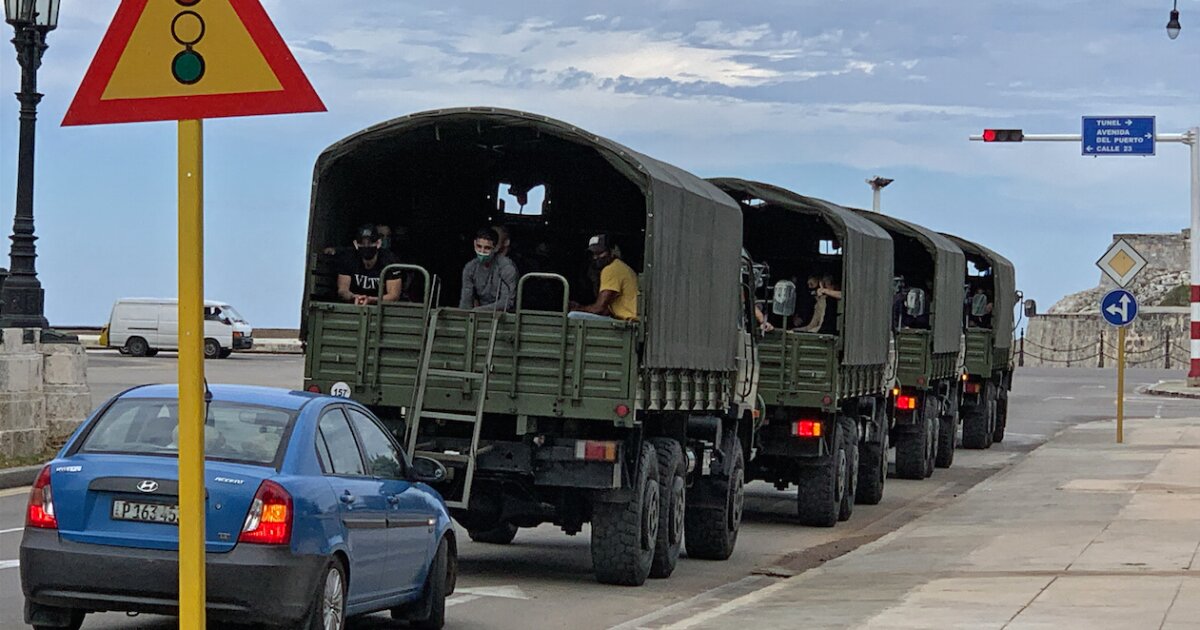In the WhatsApp group of my son's secondary school class, mothers asked each other how safe it was to take their kids to school on Monday the 15th. There was talk of violence and vandalism, but also of police taking teenagers off the streets. In the end, more than half of the class was absent that day, and many of those who attended did so accompanied by adults.
15-N also marked the resumption of in-person classes for my little girl who, after almost two years of social distancing, longed, like her friends, to go back to school. Great turnout was expected, but, in the third grade, fewer than 20 students attended.
It is no trivial question that the call for a peaceful march generated such a paranoia and psychosis in society. In fact, what we saw was the manifestation of Cubans' visceral, intense and disproportionate fear, latent in them as a result of six decades of defenselessness in the face of totalitarianism.
The mass hysteria of last Monday, reflected in scholastic absenteeism, and in businesses that did not open - extreme responses to a relatively small and isolated event - has laid bare the psyche of the nation ... and it is not pretty.
Cubans have learned to passively tolerate oppression. They have the subjective feeling, the conviction, that they can do nothing to change their destiny. Hence, their adaptive response is accommodation rather than confrontation. Because they believe that they are helpless, they do not join in attempts to change the country, and they are often hostile to those who propose alternatives to passivity, as others' rebellion reminds them of their own cowardice.
As Castroism has proven incapable of delivering a better tomorrow, its political project has no future, and no one participates with any conviction in the collective effort that once inspired so many. This is why Cubans do not live. They survive. But this is enough for a regime that, aware of its own decomposition, accelerates dispossession while struggling to sustain itself through fear and hopelessness.
Events such as 11-J, 15-N and the altercations in front of the Ministry of Culture (27-N) have not been definitive, but they are small wake-up calls for the people, who, upset and depressed, are forced to look at themselves and rethink their adaptive passivity because of the example, the martyrdom, of those who are rebelling.
This process of example setting may be long, however, as for ordinary Cubans the psychic cost of acquiring new knowledge that explains their reality exceeds the advantages that possessing it would bring. Prison is more uncomfortable when it is known that it is a prison. Without hope, chains are more bearable.
The question that permeates the nation's subconscious is: why should I bother to understand the evil of the system if I cannot change it? Even though most never explicitly formulate it this way, the idea is there, and their own statements, in the first person singular, are key to why Cubans act as if, indeed, they cannot alter their reality.
The destruction of civil society, culminating in the elimination of private property and of all horizontal associations independent of the Government, is the reason why each Cuban, despite his neighborly, cheerful and festive sociability, is an isolated entity incapable of forging a collective response that balances the current asymmetry of power between the governed and their governors.
Even today, when on the accessible Internet there are content generators revealing the perversions of the Castro system, and offering credible alternatives, this information does not sway the people much, as there is a spontaneous and automatic refusal to know, for people are convinced that knowledge is, ultimately, useless.
Fear and despair, nevertheless, are feelings stemming from the past, and no matter how effective the government propaganda bombardment is, they will gradually crumble before new realities that erode them. Today and tomorrow increasingly belong to those who reject fear and hopelessness.
Every action entails an intention, and every intention needs an objective, but there are no objectives when paralysis dominates the soul. Therefore, the first thing is to shake up the people by normalizing constant confrontation, to force the totalitarian beast to show its true face, so that more and more Cubans, outraged, see reality for what it is and abandon their self-imposed ignorance.
Yes, on 15-N fear won, as the totalitarian government threatened, humiliated, harassed, denigrated, lied, intimidated and imprisoned, pulling out all the stops to prevail, through lies and force, because it can no longer convince. On 15-N Castroism won, but, as the famous Greek general said: "Another victory like this one and we?re done for." With every such "victory" Castroism is more and more isolated, both inside and outside the country.
To wake up the people, and emerge victorious, many more "defeats" like the one on 15-N are needed.
